Is a German Shepherd the Dog for Me?
**Please read before completing the Adoption Form**.
High Energy and Drive - If you don't own a pair of walking boots then a German Shepherd is not the dog for you. German Shepherds were bred as working dogs, they have a real drive to work so will need training to stimulate their brains. Activities like agility and tracking are a good way to entertain and tire out a GSD. If you are looking for a dog who is content with nothing more than a pleasant walk in the evening, go elsewhere.
I will Protect You - German Shepherds are naturally protective, they like to have a propose and they will protect you. While this is reassuring it can also cause problems this is why training classes and socialisation are a must.
Shedding and Mess - German Shepherds cast constantly, and they are dogs who like to swim and play in muddy puddles. They are not the dog for the house proud owner or the allergic.
Companionship - They like to be with you. German Shepherds love human company, they don't like to be left and will even follow you around from room to room just to be close. They do best where there is someone at home most of the time.
Not Everyone's Best Friend - German Shepherds don't greet everyone they meet as their new best friend, they are reserved and often aloof. A well trained German Shepherd will greet strangers happily, but generally reserve their enthusiasm for family and special people.
Rules and Boundaries - If you can't enforce the rules of your household (in a firm but fair way), and to enforce them consistently, you will find that the ruler of your house has four legs and a wet nose. German Shepherds are very smart, if you aren't in charge, they will be.
Smart - German Shepherds are very intelligent. These dogs MUST be given at least basic obedience training, and many owners participate in dog activities (agility, flyball, tracking, competitive obedience) just to keep their GSDs occupied. A bored GSD can be very destructive.
Vocal - German Shepherds are very vocal, they do like to bark. You don't need a door bell when you own a GSD! They are naturally protective towards their family and property so you will need to think how you can manage this so as not to upset friends and neighbours.
If you don't have time to give your dog at least an hour of exercise a day, every day, with plenty of swimming and fetching, look elsewhere.
If you are not prepared to attend training classes to train and socialise your dog, look elsewhere.
Many of our dogs are handed in because they haven't had basic training, stimulation and the correct amount of exercise. This means they will need YOU to put in extra effort to train and socialise them. Training a fully grown German Shepherd who has missed out on basic training and socialisation as a puppy isn't an easy task but with patience and commitment it can be done. If you can't commit to this, look elsewhere.
We want homes for our dogs but we want the right homes. Too many people adopt a German Shepherd then 3 months later they are back on the phone asking us to take him/her back. Why? Because they still have the problems they had when they were adopted. Why? Because the new owner hasn't attended training classes and hasn't worked on training and socialisation.
And finally A DOG IS FOR LIFE. Too often these days we have people asking us to take dogs back that they adopted from us in the last 5 years. If you can't commit to 10-15 years of dog ownership then don't complete the adoption form. We appreciate that there are genuine cases where people need help but it's heartbreaking for us to take a dog from a broken home, find it a new home, only to get a call 3 years down the line, the adoptive family wants to hand the dog back because they are splitting up and neither partner wants the dog. Unwanted again, through no fault of their own.
Re-homing Conditions (please read carefully)
In general we do not re-home in the following conditions:
- Where a dog is going to be left longer than 3-4 hours on a daily basis, as this is very unfair to the dogs.
- To applicants living in upstairs flats, as this can not only cause problems with neighbours, but it can also cause problems with the dog’s hips.
- Where a dog is going to be used for guarding purposes.
- To any applicants who intend to use any dog for breeding, as we have a no breeding policy. The rescue is not in a financial position to neuter/spay before adoption, but at the time of adoption you will be asked to sign an agreement that the dog will be taken to the vet for this procedure to be carried out within 6 months of adoption, or as soon as feasible. You will be asked to provide evidence that the procedure has been carried out. Some dogs will have already been neutered or spayed by their previous owner.
- We do not re-home with cats.
- We do not home to families with children under the age of 10.
- We do not home to shared gardens.
- We do not re-home where there is no secure garden area for the dog to go into.
- Following adoption we ask that all new owners insure their new dog as soon as possible - vet fees can be very expensive!
Please note: German Shepherd Rescue Scotland does not pay vet's fees after adoption.
Adoption Process
This is the adoption process in brief but please read on for full details of how the adoption process works at German Shepherd Rescue Scotland.
- Complete an Adoption Form.
- Someone from German Shepherd Rescue Scotland will telephone you.
- A home-check will be arranged.
- Your vet will be contacted for a reference.
- Someone from German Shepherd Rescue Scotland will contact you to tell you if your application to adopt has been accepted.
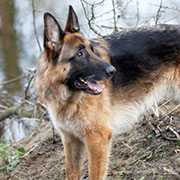 |
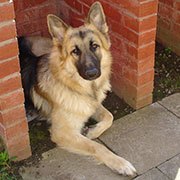 |
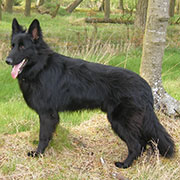 |
What is the first step towards adopting a German Shepherd?
To begin the adoption process, please complete the Adoption Form at the bottom of this page. It is in your own best interests that you are honest with your answers and don't put what you think we want to hear. The completed form will be sent to one of our re-homing volunteers, who will then contact you by telephone to discuss adoption and to organise a home-check.
What happens next?
When our re-homing volunteer telephones he/she will discuss your specific situation, i.e. if you have owned a German Shepherd before, how the dog is to be accommodated, any other pets you have, how much time will you be at work/have available to spend with your dog, and your family commitments.
After talking things through with us, if you decide that you still want to go ahead we will arrange a convenient time to visit you at home to do a home-check. We will also contact your vet for a reference. Please do bear in mind that as we are all volunteers many of us have day jobs so we cannot always arrange an immediate visit. We will however do our best to meet with you as soon as possible.
After your home-check has been completed and we have received your vet reference we can advise you of a dog that may be suitable for you. If there is not a dog available at that time, we will contact you when there is.
Will I get a dog suitable for me?
When placing a dog in a new home, care is taken to ensure that there is a good match between the dog, its new owner and the new home environment in which it will be living. Not every dog will be right for a given environment and not all potential owners will be right for a given dog. Sometimes we get requests from individuals who attempt to give us a detailed description (often highly unrealistic) of a dog they would like us to provide them with, and whilst we do try to find a dog that fits in with the wishes of the prospective new owner, dogs do not 'come to order', they are all individual and have their own personalities. Both the dog and its new owners will have much learn from each other and will require time to adjust, but if approached with a practical and realistic attitude, adopting a German Shepherd can be a deeply rewarding experience.
What can I do to prepare for the arrival of my new dog?
To help you prepare for the arrival of your rescue dog we have put together some helpful information.
Preparing for your Rescue Dog - please click the link to access this page.
Arrival of your new best friend!
If all goes well and we are able to place a suitable dog with you, we will contact you again to arrange a suitable day and time to bring your new companion. To keep our costs down, you may be asked to travel to meet with a volunteer to pick up your new dog. On accepting your new dog you will be asked to fill in and sign an adoption form which sets out the legal conditions of adoption from German Shepherd Rescue Scotland.
In order to help you through the initial stages we will keep in touch to see how your new dog is settling in and how you are managing. During this period we will do our best to ensure you get any support and guidance you need. Telephone support is available, so there is no need to worry about being left to cope with any problems alone. Most placements do succeed well and some of our adopters even come back for more!
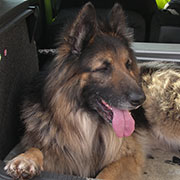 |
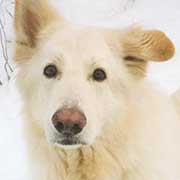 |
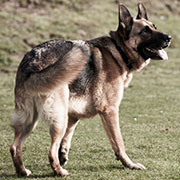 |
Please make sure you have read the re-homing conditions at the top of this page before completing the form.
- We do not re-home to applicants living in upstairs flats, as this can not only cause problems with neighbours, but it can also cause problems with the dog’s hips.
- We do not home to shared gardens.
- We do not re-home where there is no secure garden area for the dog to go into.
